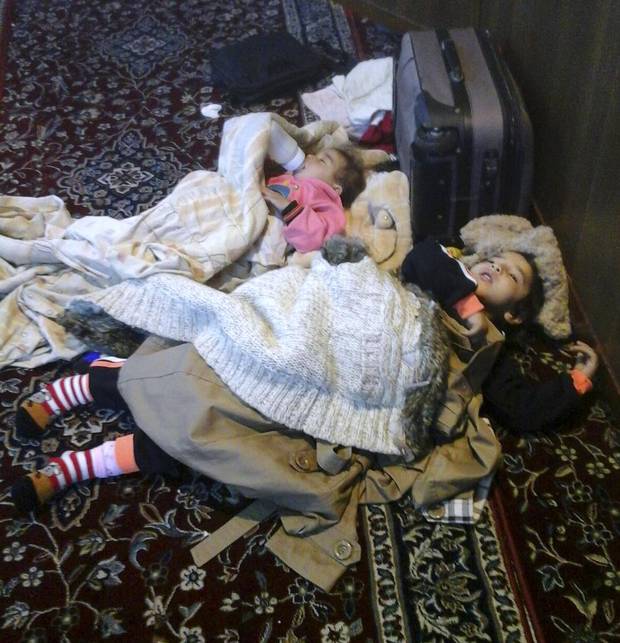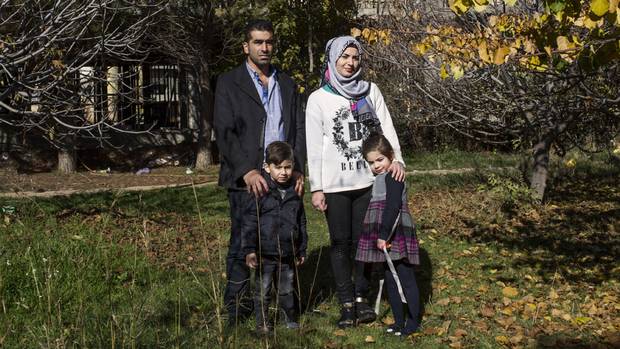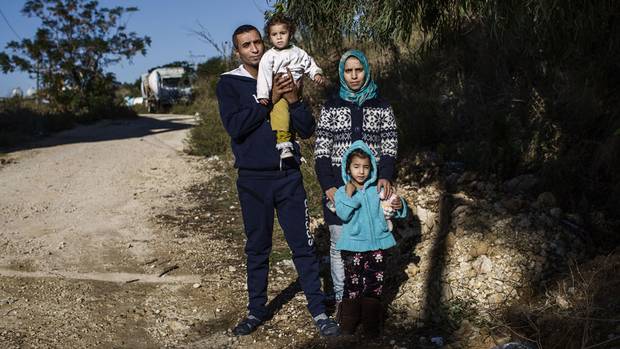They were supposed to be on flights that would take them to Toronto. Instead they slept in the mosque of the Beirut airport.
Five-year-old Karima and her little sister, Ayat, slept on the carpeted floor Wednesday, while their parents, Iwan and Zamzam Dalaa, asked themselves what went wrong. Days before, Mr. Dalaa had expressed anxieties about it all going wrong at the last minute, and now it seems his worst fears were coming true.
They were still there on Thursday even as, at the same the airport, 160 other Syrians were being escorted onto a Canadian government plane for transport to Toronto in the first of the much-touted airlift of refugees. But the Dalaa family, along with several others who had been approved for resettlement to Canada but were given tickets to fly there on commercial flights, were left stranded, wondering if their dreams of starting a new life in Canada had been dashed.
Only a few days earlier, Ms. Dalaa had welcomed The Globe and Mail into the makeshift home on the outskirts of Beirut where she and her husband weighed out loud whether to bring milk for the baby, her makeup kit, the family Koran or other keepsakes as they started a new life. So had the Habash family, who bantered back and forth about what to pack for their big journey. They spent Thursday at the airport, uncertain what was happening, and without the money to buy even a bottle of water.

Thursday’s Folio pages detailed items the Habash and Dalaa families planned to bring to Canada – jars of cured eggplants, photographs, an old watch, a hairdryer, a teddy bear.
DIEGO IBARRA SÁNCHEZ/for The Globe and Mail
The details of why these Syrian refugees were not permitted to get on their flight to Toronto via Cairo Wednesday night are still unclear. The Globe and Mail spoke to three Syrian refugees who missed the flight and ended up sleeping in the airport, some with no money and no place to go.
They said staff of the International Organization for Migration, who are assisting the Canadian embassy in Beirut with travel logistics for refugees cleared for resettlement, hinted there were delays in arranging exit visas and travel documents from Lebanon's security services. Those documents are required for Syrian refugees to leave Lebanon.
The IOM did not respond to repeated requests by The Globe and Mail for comment. The Canadian embassy in Beirut forwarded queries to Ottawa.
"Things went wrong when [we went to check in] to weigh our luggage," said Almasa Habash, who along with her husband, Mohamed, and two children, Nada and Thaem, had tickets to board the 7 p.m. flight Wednesday.

Karima, 5, and Ayat, 1, children of Iwan and Zamzam Dalaa, sleep in the airport mosque after not being allowed to board a commercial flight that would take them to Canada. The family was one of several Syrian refugees left stranded in Beirut after being denied boarding.
Iwan Dalaa/for The Globe and Mail
Syrian refugee Thaem Habash stands by a luggage cart at the Beirut airport. The family was booked on a commercial flight to Cairo and then onto Toronto, but was not permitted to board the plane because of an apparent mishap with documents required for Syrian refugees to leave Lebanon.
Almasa Habash/for The Globe and Mail
According to Ms. Habash, her husband does not have a passport and was expecting to be given a travel document from the Canadian embassy permitting him to leave the county. But when he went to weigh his luggage, IOM staff told him the document was not ready.
It is still unclear whether this meant the embassy had yet to issue one or whether Lebanon's General Security Directorate had yet to stamp it, permitting his exit from the country.
Ms. Habash said that her papers, as well as those of their children, were in order and she was told they could board the flight, leaving Mohamed behind, if they wished.
"I said no," she explained.
She said there were five other Syrian families with similar issues, around 18 people in total. All of them slept at the airport mosque Wednesday night hoping matters would be resolved by Thursday morning.
By Thursday afternoon, the family had not received any updates from the IOM.
"We were in shock that this was happening," she said, angrily. "They were reckless, they should have checked this."
Mr. Dalaa and his family did not have money to go back to their home in Dbayeh. "I don't even have money to buy a bottle of water," he said, Thursday afternoon, still at the airport.
"There's no way to describe how we feel," he said. "The way we were treated. Our spirits are zero."

Mohamed and Almasa Habash, with 5-year-old Nada and Thaem, 4, fled Zabadani, Syria, three years ago and will be on a plane this week bound for Canada.
Diego Ibarra Sánchez / MeMo/for The Globe and Mail

Iwan and Zamzam Dalaa pose with daughters Karima, 5, and Ayat, 1. The family fled their hometown of Sekeen in Idlib four and a half years ago.
Diego Ibarra Sánchez / MeMo/for The Globe and Mail
Mr. Dalaa said he tried to ask the IOM staffer why they were being made to wait, when other families proceeded to the immigration gate. "But I got no response."
The family eventually met someone at the airport who agreed to drive them to Dbayeh, where Mr. Dalaa's extended family resides in a half-finished building free of charge.
By Thursday, he said he had not heard from the IOM about whether their papers were ready. Mr. Dalaa said he and his wife have passports but that their two children, age 1 and 5, did not.
Wheel-chair bound Mahmoud Maree came to the airport at noon, because he was under the impression the flight was leaving at 3 p.m. He was told his passport was still with General Security and that he would not be able to fly that day. "I was devastated, and I didn't know what to do or where to go."
Fawzi al-Zioud, the head of the IOM office in Lebanon said he didn't have specific details about the missed flight – he said he is not the designated IOM representative to comment on the matter – but suspected the case might be due to delays on the part of Lebanese security officials to process exit permits.
"IOM has no role in [issuing] exit formalities," he explained, adding it was not uncommon for General Security to hand the stamped travel document to passengers at the airport on the day of departure.
Khalil Gebara, an aide to Lebanons's Interior Ministry, which supervises the work of General Security, rejected the notion that the security service was at fault. "All requests [for exit visas] from any embassy [are] being processed," he said. "Especially the Canadians."
